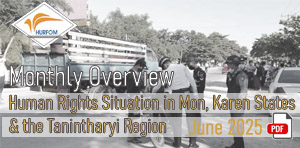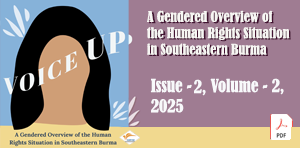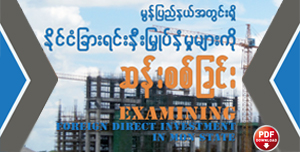National Politics Party, NUP and USDA Start a Secret Campaign for 2010 Elections
October 29, 2009
Unsurprisingly, Burma’s 2010 elections will not be free and fair, even though the ruling military government has yet to announce any restrictive or biased election laws, elections processes, or political party formation laws. The SPDC has already privileged the secret campaigns of certain military commanders, the National Politics Party (NPP), and other SPDC-supporting political groups like the National Unity Party (NUP), and the Union Solidarity and Development Association (USDA).
In Mon State, according to news from local political analysts, Brigadier. Gen. Ohn Myint (a Mon State native from Mudon Township and the former SPDC’s Minister for Mining and National Resources) and the military commanders from the Southeast Command, traveled to many Mon villages and had official discussions with local community leaders. Brigadier Gen. Ohn Myint has promised to the villagers in Mon State that he will provide for a great deal of community development projects in the future. This is an attempt at ‘vote-buying’ in Mon State.
According to an unconfirmed information source, Brigadier. Gen. Ohn Myint will be promoted to the office of Prime Minister of Mon State if he wins in the elections, as he is a native to Mon State. Currently, he is the chairman of the Mon State USDA. All current military commanders will be retired when the electoral laws are announced, and they will form a political party under the name of National Politics Party (NPP).
In a similar situation, the country’s former socialist party under a new name, the NUP, started their campaign activities in mid-2009. They have contacted the former socialist party members (who ruled Burma from 1974 to 1988) and their relatives, to invite them to apply as members to the newly-formed NUP. They also have secretly met with village leaders and tried to buy votes from the people. They promised that if they win in the elections, a greater percentage of their budget will go to their voters.
While there is no clear procedure for the 2010 elections, the SPDC has already allowed their supporting political parties to commence their election campaigning, while they have not allowed pro-democracy parties like National League for Democracy (NLD), or ethnic parties like the Shan National League for Democracy (SNLD), to do the same.
If it relies on the 2008 constitution, the SPDC does not need to include any opposition parties in Parliament, and they do not have to allow any political debates. If political debates should happen to attack the Burmese Army, the country’s military leaders can legally seize power from the civilian government.
What do these elections even stand for, if they just prolong the life of the dictatorship in Burma?
Comments
Got something to say?
You must be logged in to post a comment.



















































